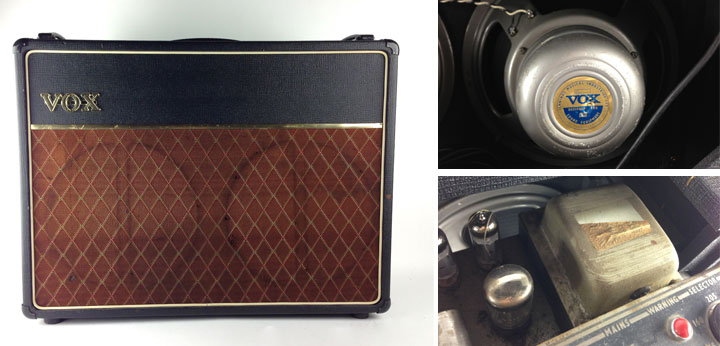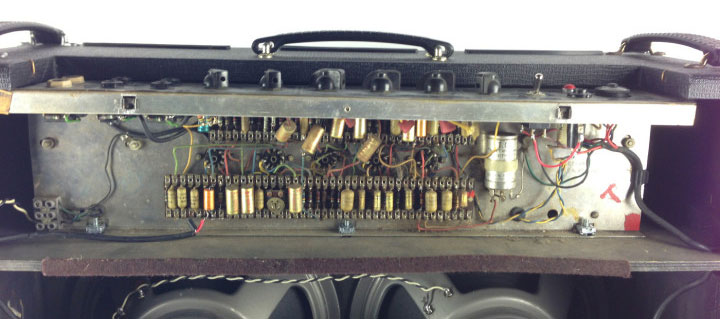The Vox guitar amplifier—and the AC30 model in particular—has played a storied role in popular music history. Before Marshall, Orange, Hiwatt, or any other beloved British amps hit the scene, Vox was there, defining in a very authentic sense the sound of the British Invasion.
Of course, Vox is still around today—and still vital. It’s been owned by Korg electronics since the early 1990s, with the manufacture of amps now taking place in China. But the sound is still there, and so is the AC30, along with many variations on the theme over the years.
Many thanks to Jim Elyea’s exhaustive tome “Vox Amplifiers: The JMI Years” (History For Hire Press) and the folks at North Coast Music in Cudahy, Wisc. for information that contributed to this article.
What makes an AC30 sound like an AC30?
To truly capture the character of an amp in precise terms, you can address it through the science of electronics, or the art of describing sound via sense. Here’s a little bit of both: Early AC30s were fitted with alnico magnet Celestion speakers. The tubes in a Vox consisted of EL84s in the output stage and 12AX7s in the pre-amp stage. As for the flavor, Vox amps have a very warm, creamy sound that compresses magically, and breaks up slightly, as you turn them higher in volume. If you zero in on any Beatles recordings from 1962 to early 1966, that’s the guitar amp sound you hear. It’s a British aural mix of scones, marmalade and tea—with a good solid kick to it.

1964 Vox AC30, sold on Reverb
The AC30 Origins
The company that introduced Vox was known as Jennings Musical Instruments, or JMI, headquartered in Dartford (the hometown of Keith Richards, mates). British big band guitarist Dick Denney is credited as the godfather of the Vox AC30, along with engineer Derek Underdown. Denney began work on the earliest version (with a single speaker) in 1959. As Vox sought to compete with the sound and volume of bigger Fender amps, two speakers were utilized. Vox eventually hit the mark with an AC30 “Top Boost”—so named because it had separate controls (first on the back of the amp) that introduced an extra gain stage, bass and treble. It also had six inputs, two each for normal, brilliant or vibrato channels. Also popular: the AC30 "Super Twin" with a trapezoid-shaped head, its cabinet mounted on a trolley.
Through the 1960s, AC30s were made with both separate amp head and speaker cabinets (like the Super Twin), and also in a unified chassis, with the control panel mounted on the top—the standard configuration for AC30 amps today.
Vox and the Beatles
The Beatles started playing AC30s before they became famous. But they kept playing them as they hit it big, and as a result made the amp legendary. Here’s how:
Reg Clark, the manager of London’s Vox showroom, was visited by Beatles manager Brian Epstein in January 1963. As Elyea describes it, Epstein pulled up in a Rolls Royce and smooth-talked Clark into trading two new AC30s for the band’s two beat-up ones, even up. Clark secretly agreed, even though Vox owner Tom Jennings nixed the idea.
As a thank you, Epstein promised Clark that when the Fabs became big, they would always play Vox amps through their career. And the rest, indeed, is tube-amp history. And for Clark, not a bad trade-in: “It was the biggest promotional score ever, for absolutely free,” Elyea says.
The post-JMI Years
It’s a soap opera, amp fans. Around 1967, Vox (now owned by a company called Royston) lost both Dick Denney and Tom Jennings. It eventually foundered into bankruptcy, and in the years that followed, the company ownership went through more quick changes than a hand-me-down coat. The roll call includes Birch-Stolec Industries (1970) Dallas Arbiter (1973), and Rose Morris (1978).

The AC30 went through some design changes during that time, not necessarily for the better. Birch-Stolec started using printed circuit boards, a move reversed by Dallas Arbiter, but then restored by Rose Morris. The AC30 almost ceased production for good in the mid 1980s because of a shortage of good tubes. Instead, RM came out with a “Silver Jubilee” version in 1985 that trimmed back the gain in the preamp stage—a workaround for the cheap tubes available at the time.
The Korg Years: 1992 to present
Though Korg began its life as a Japanese builder of drum machines and keyboards it’s beyond doubt that their involvement with Vox saved the brand and made it more robust for the 21st Century. Today’s overseas-made AC30 models perform respectably—the AC30C2, for example, makes use of 12AX7 preamp tubes and use EL84 tubes, along with two 12" Celestion G12M Greenback speakers, or Celestion Alnico Blue Speakers. Vox also introduced a hand-wired version, AC30HW2X, around 2010 that’s earned solid reviews for its singing tone and versatility.
And who’s played through Vox amps over the years?
THE WHO
Most rock fans associate Pete Townshend with Marshall & Hiwatt amplifiers. But before that, Townshend and bassist John Entwistle entered into a Vox endorsement, and used the amps to propel their early studio and stage efforts. That is, until they started smashing them.

Brian May and his Vox wall
VIC FLICK
Though not as well known in America as other guitar heroes of the era, Vic Flick will forever remain in the hearts of Swinging '60s fans as the axe man who wrote and played the James Bond theme—through a Vox, it turns out.
BRIAN MAY
In Queen, May had a wall of them on stage. His signature model of the AC30, no longer made, has one volume knob on it—that’s it.
PAUL WELLER
Through his career with the Jam, Weller never deviated from his trademark sound of a Rickenbacker guitar through an AC30—and live, a phalanx of them. As a tribute, the complete box set of Jam recordings (“Direction, Reaction, Creation”) features a cover photo of Ricks leaning up against a cream-colored Vox AC30.
THE EDGE
The Edge’s main guitar amp for years has been a 1964 AC30 in a 1970s cabinet, with early 1970s Vox amps as backups. He’s used the Vox on just about every U2 album.
Others players include: Matchbox 20, Tom Petty, Peter Buck, Jeff Tweedy, Noel Gallagher, Brad Paisley
